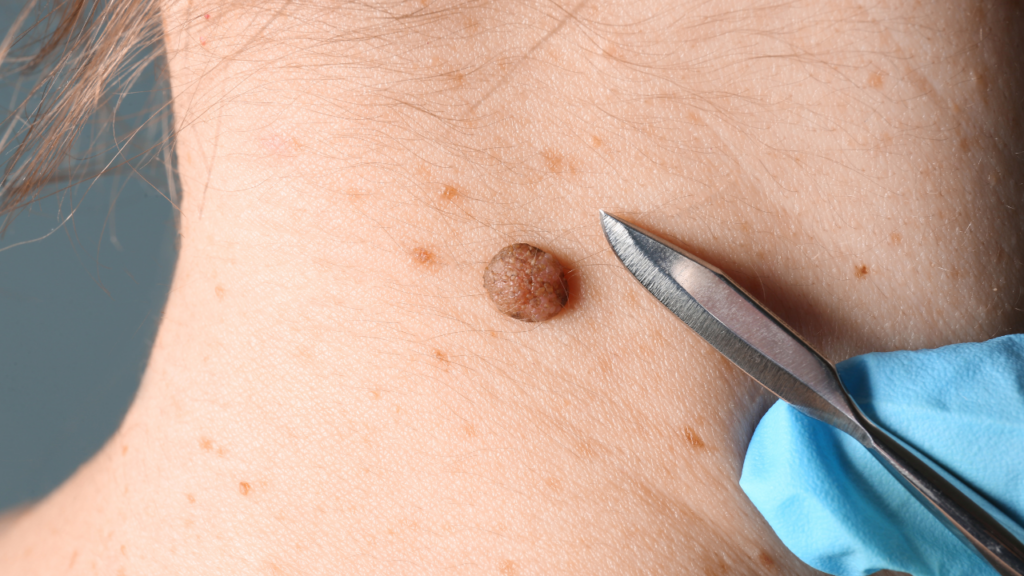|
Getting your Trinity Audio player ready...
|
Skin cancer remains one of the most common forms of cancer affecting people not only in the U.S. but the entire world. Recognizing early signs and symptoms is fundamental for timely treatment and better health outcomes.
This disease arises from the mutation of abnormal cells within the skin’s epidermis and might be influenced by age, sun exposure, and genetic predisposition. Through understanding and vigilance, individuals can work alongside healthcare professionals to detect skin cancer promptly. This article aims to provide vital insights into recognizing early signs and strategizing interventions.
How to Recognize Skin Cancer?
The ability to recognize skin cancer in its initial stages is critical. Often, it may present as a new growth, a mole that changes in appearance, or a lesion that doesn’t heal. Regular inspections of the skin for any abnormalities can be the first line of defense against disease progression. When examining the skin, homogeneity in color, shape, and size is considered normal. Conversely, moles or growths that exhibit asymmetry, border irregularities, variations in color, evolving dimensions, or lesions that bleed might be indicative of malignancy.
What are the Causes of Skin Cancer?
Sunlight and the ultraviolet (UV) radiation emits are primary risk factors for developing skin cancer. Overexposure to UV rays can lead to DNA damage in skin cells, potentially resulting in a mutation that causes these cells to grow uncontrollably. Besides sun exposure, factors like certain medications that suppress the immune system, exposure to toxic substances, or a history of sunburns may elevate the risk. Furthermore, a dermatologist might identify individuals with lighter skin or with a family history of skin cancer at greater risk.
Common Signs and Symptoms for Different Skin Cancer Types
Basal Cell Carcinoma
Basal cell carcinoma is a type of non melanoma skin cancer, often manifesting as a painless raised area of skin that may be shiny with small blood vessels running over it. It might present in various shades, such as pearly white or flesh-colored. These lesions typically arise in areas frequently exposed to the sun, such as the head or neck.
Squamous Cell Carcinoma
Squamous cell carcinoma may appear as a firm, red nodule or a flat lesion with a scaly, crusted surface. These skin changes may not necessarily cause discomfort but should prompt immediate attention from a healthcare provider, as they might evolve rapidly.
Merkel Cell Carcinoma
Merkel cell carcinoma is less common and often presents a high risk of spreading. The cancerous growths may look like red or purple nodules occurring on or just beneath the skin and in the hair follicles. Early diagnosis of Merkel cell carcinoma is crucial given its aggressive nature.
Melanoma
Melanoma represents the most severe type of skin cancer and can develop from an existing mole or appear suddenly as a new dark spot on the skin. Recognizing changes in moles, such as asymmetry, border irregularities, color changes, and size growth, is integral in identifying this type of cancer.

Tests and Treatment for Skin Cancer
Once suspicious skin changes are noted, an appointment with a dermatologist is necessary to review and possibly perform a biopsy. If skin cancer is diagnosed, treatment options, such as surgical excision, Mohs surgery, chemotherapy, and radiation, are considered based on the type, location, and stage of cancer. Treatments may have varying side effects, and it is essential for a patient to discuss these with their healthcare provider.
Outlook on Skin Cancer Patients
When to See a Healthcare Provider?
An individual should consult a healthcare provider if they notice any new skin lesions or changes in an existing mole or growth. Setting up regular skin reviews with a dermatologist is advisable, especially for people with increased risk factors.
What Questions to Ask Your Healthcare Provider?
On an appointment with your healthcare provider, it may be helpful to inquire about personal risk factors, methods to reduce risk, the need for medical imaging or genetic testing, and the available treatment options that support your lifestyle and personal preferences.
Overview of Products & Services for Skin Cancer Patients
Products such as broad-spectrum sunscreens, protective clothing, and hats designed to block UV radiation are beneficial for patients. Services, including support groups and counseling, can also provide individuals with emotional and psychological support as they navigate their journey with skin cancer.
News on Skin Cancer Research
Continuous advancements are being made in the field of skin cancer research, providing new insights into effective treatments and prevention strategies. In online medical platforms such as DrTalks, summits on genetic mutations and immunotherapy are organized, which can drastically transform the treatment understanding for skin cancer patients.
In Summary
Understanding the risks, recognizing the early signs and symptoms, and knowing when to reach out for professional medical advice are key components in managing one’s skin health. Acknowledging these elements empowers individuals to proactively participate in their well-being, creating a context of informed vigilance against skin cancer.
With ongoing research and education, there is a confident outlook for those managing skin cancer, their supportive healthcare practitioners, and the broader medical community.
References
Saladi, Rao N., and Andrea N. Persaud. “The causes of skin cancer: a comprehensive review.” Drugs of today (Barcelona, Spain: 1998) 41, no. 1 (2005): 37-53.
Wong, C. S. M., R. C. Strange, and J. T. Lear. “Basal cell carcinoma.” Bmj 327, no. 7418 (2003): 794-798.
Schwartz, Robert A., and Robert A. Schwartz. “Squamous cell carcinoma.” Skin cancer: recognition and management (1988): 36-47.
Becker, Jürgen C., Andreas Stang, James A. DeCaprio, Lorenzo Cerroni, Celeste Lebbé, Michael Veness, and Paul Nghiem. “Merkel cell carcinoma.” Nature reviews Disease primers 3, no. 1 (2017): 1-17.
Schadendorf, Dirk, Alexander CJ Van Akkooi, Carola Berking, Klaus G. Griewank, Ralf Gutzmer, Axel Hauschild, Andreas Stang, Alexander Roesch, and Selma Ugurel. “Melanoma.” The Lancet 392, no. 10151 (2018): 971-984.



This article truly underscores the critical importance of awareness and early detection in the fight against skin cancer. As someone who recently benefited from a routine dermatology check-up where a squamous cell carcinoma was detected early and successfully removed, I can’t emphasize enough how crucial these appointments are. 🩺🍀 It’s a stark reminder that being proactive about our skin health can lead to timely intervention, significantly better health outcomes, and in many cases, complete recovery.
The detailed breakdown of recognizing the signs of different types of skin cancers is incredibly informative. Understanding what to look out for, from basal cell and squamous cell carcinomas to the more aggressive Merkel cell carcinoma and melanoma, empowers us to take charge of our health. 🕵️♂️🔍
The emphasis on the contributing factors, such as sun exposure and genetic predisposition, further highlights the importance of preventative measures. It’s fascinating yet alarming how our environment and lifestyle choices can play such a pivotal role in our skin health. 🌞➕🧬=🚨
I’m particularly grateful for the insights into the various treatment options available. Knowing that there are tailored treatments based on the type, location, and stage of cancer offers a beacon of hope for many facing this diagnosis. The advancements in treatments and the ongoing research shared in platforms like DrTalks are incredibly encouraging, showcasing the strides we’re making in combating this disease. 💉🔬
I’d urge everyone to not only keep an eye on their skin for any changes but also to maintain regular check-ups with a dermatologist, especially those with increased risk factors. It’s a practice that has personally made a significant difference in my life and could potentially save yours.
Let’s all spread the word about the importance of skin cancer awareness and early detection. It’s a conversation that could truly save lives. 💬❤️ #SkinCancerAwareness #EarlyDetectionSavesLives
👏 This article adeptly underscores the necessity of early detection and vigilance in managing this widespread form of cancer. By delving into the causes, symptoms, and types of skin cancer, it empowers readers to recognize potential warning signs and take proactive steps towards their skin health. Furthermore, its discussion of available treatments and ongoing research offers a beacon of hope for patients and healthcare providers alike. As someone invested in raising awareness about skin cancer, I find this article to be an invaluable resource, equipping individuals with the knowledge and tools necessary to navigate their journey with confidence and informed decision-making.🌟